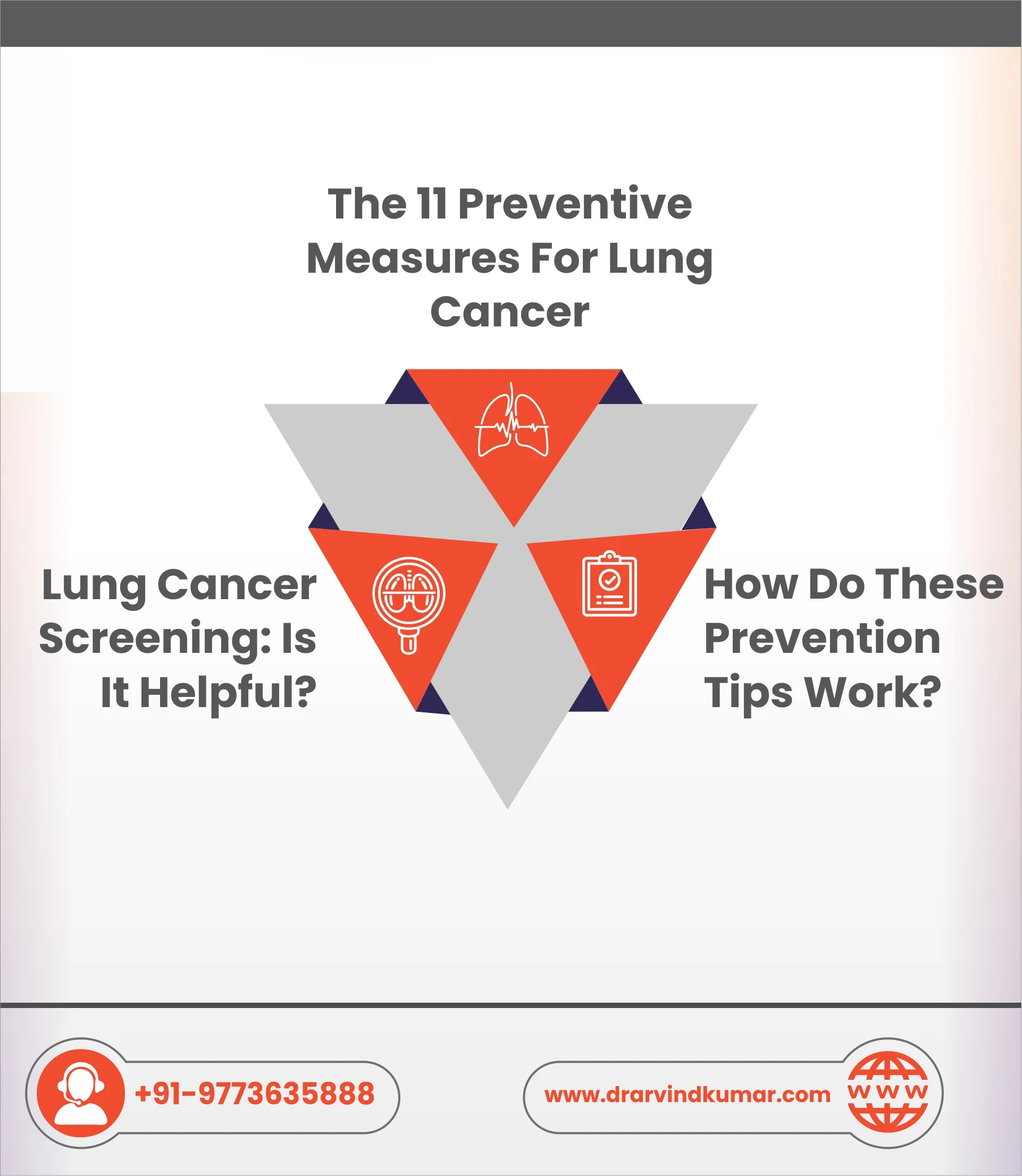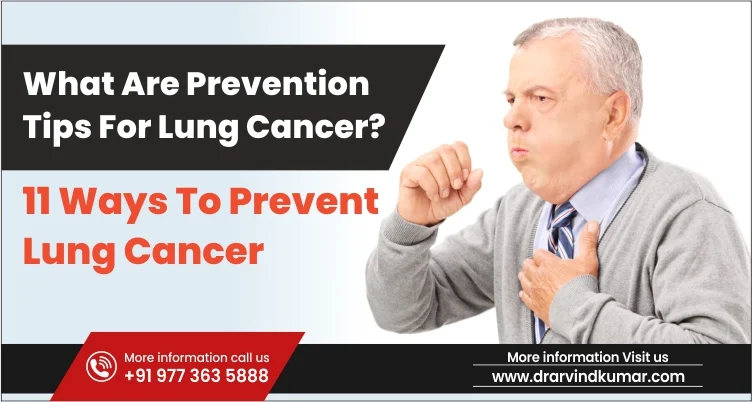Can you prevent lung cancer? The answer to this question is not as simple.
Lung cancer is one of the deadliest global diseases across the globe. It is the second most common form of cancer and the cause of the maximum number of cancer deaths.
To think that there could be ways to prevent lung cancer sounds too good to be true. And while these prevention methods would not ensure that you would never develop lung cancer, they substantially reduce your chances of having it. How to Prevent Lung Cancer
This article aims to give you an account of the preventive measures for lung cancer. It could help you and your loved ones lead a healthy life in the long run. Read on to learn the 11 ways you can evade lung cancer.
How Do These Prevention Tips Work?
Cancer is a highly unpredictable disease. Numerous external and internal factors can trigger cancerous growth in your body in many ways. And its not always possible to avoid these triggers.
Studies regarding lung cancer prevention and treatment have been going on since the medical concept of cancer became clear. During this period, scientists have discovered several of these triggers and how they might play a role in the development of cancer.
Researchers have put forth a list of the risk factors for lung cancer. This list includes the various factors that act as a carcinogen or put you at a higher risk of developing lung cancer. The tips for lung cancer precautions are based on these risk factors. If you avoid or limit your exposure to these, your chances of having lung cancer will surely decrease.
The 11 Preventive Measures For Lung Cancer
This section of the article tells you about the 11 main ways to prevent lung cancer.
Please note that prevention from lung cancer does not mean that you are sure never to develop this disease. However, these tips focus on the major factors that contribute to the triggering of cancerous genes or induce cancerous growth. And limiting or avoiding these triggers would naturally lower your chances of having the disease.
1. Quit Smoking
There is no different way to put it. Whether you do it occasionally or regularly, smoking is hazardous to health. There is no safe level for this; any cigarette smoke entering your body makes you more prone to developing lung cancer.
Smoking is the biggest cause of lung cancer worldwide. This includes smoking cigarettes, cigars, pipes, e-cigarettes, and menthol cigarettes. Up until the early 20th century, lung cancer was a rare incidence. But then, as the number of smokers increased worldwide, lung cancer took over to be among the most common deadly diseases.
The smoke from a cigarette contains 70,000 different chemicals, including arsenic, benzene, formaldehyde, etc. Among these, 70 chemicals are known to be carcinogenic to humans. Smoking increases the risk of developing lung cancer in women by 25.7 times, while in men, the risk increases by 25 times.
Smoking increases your blood pressure and reduces your energy levels. It also degrades your lung function and makes you more prone to a heart attack. Besides lung cancer, smoking cigarettes also lead to cancers of the oral cavity, trachea, larynx, esophagus, bronchus, pancreas, liver, stomach, colon, kidney, urinary bladder, renal pelvis, and cervix.
It is never too late to quit smoking for the prevention of lung cancer. No matter how long you have been smoking, your chances of developing lung cancer decrease when you quit.
Studies have shown that people are at about 30 to 50% lowered risk of lung cancer after 10 years of quitting. If you are having trouble with it, you can ask your family or loved ones for help. Also, several programs like nicotine replacement therapies help you free yourself from your addictions. You can join one such program to quit smoking for good.
2. Avoid Exposure To Second-hand Smoke
Tobacco smoke, regardless of the way it enters your body, has adverse effects. There is no difference between the smoke that enters your body directly from smoking and inhaling second-hand smoke. The only distinction is that smoking exposes your body to a larger amount of those chemicals.
Studies have found that if you never smoke, but are regularly exposed to second-hand smoke, your chances of developing lung cancer increase by 20 to 30%. This could add to the other risk factors for lung cancer, like genetic factors that cannot be addressed.
In recent years, several government laws have worked in favor of limiting exposure to second-hand smoke. Now you can find public places with no-smoking zones where smoking is legally prohibited as a preventive measure against lung cancer. Apart from this, promoting general awareness regarding the hazards of smoking would also work in your favor.
3. Avoid Exposure To Radon
Radon exposure is a common cause of lung cancer after smoking. Radon is a radioactive gas that occurs naturally in rocks and soils through the degradation of uranium, a radioactive element.
Oftentimes, radon seeps into the groundwater or enters your home through the cracks in the walls. As this gas cannot be seen, smelt, or tasted, you cannot tell whether or not it is in your home.
The best way to know this is by using a radon test kit. Radon test kits have been made available as a preventive measure for lung cancer. It allows for easy detection of the presence of radon in your home, which takes a few days. You may use an air purifier that claims to get rid of radon in your home if the gas is detected.
4. Avoid Exposure To Other Potential Carcinogens
You might encounter several carcinogens while going through your daily chores. Most of these account for occupational exposure. Asbestos, nickel, arsenic, cadmium, beryllium, silica, bis-chloromethyl ether, soot, and diesel exhaust are some of those potential carcinogens.
You might be exposed to these substances if you work in mines, brick factories, glassware factories, or in any such occupational setup. The government has issued orders that the employee must be thoroughly informed of the potential risks in such occupations.
If you can relate to the occupation, thoroughly review the employee manual. Also, make sure you are provided with protective gear like masks and gloves, as needed, during work. It is important to be aware of the potential hazards to take the necessary lung cancer precautions.
5. Know Your Family History Of Lung Cancer
While knowing your family history of lung cancer cannot help you prevent the disease, it would certainly help you know how much at risk of this disease you are. This awareness is also necessary. If someone from your immediate family has a history of lung cancer, you are at a higher risk of this disease than someone without a family history of lung cancer.
Hence, if you are aware of your family history of lung cancer, you can take additional precautions if needed. In such cases, activities like smoking add up to your risk of the disease.
Please note that having a family history of lung cancer does not mean you would develop the disease too. However, regularly consulting with a doctor about it and informing them about your recent health status would help you in lung cancer prevention and treatment, if the need arises, at an early stage.
6. Avoid Unnecessary Radiation To The Chest
The radiation used for medical purposes usually consists of gamma rays. Based on their intensities, these rays have the ability to kill the cells, alter their DNAs, and induce mutations. During treatment, these rays are directed at specific regions and at a calculated intensity. This limits the damage to the surrounding cells and ensures that most rays hit the target area.
Radiation therapy is also a risky procedure. As it can alter DNA, it has the ability to cause mutations that might be carcinogenic. Usually, doctors avoid prescribing this therapy due to the same reasons.
Radiation therapy or radiotherapy is used for important medical procedures like the treatment of cancer. Hence, its applications are far more significant than the low level of risk it poses.

7. Address Medical Conditions Like HIV And Lung Infections
Certain medical conditions make your lungs more prone to diseases.
One of the biggest examples is HIV. Studies have shown that having HIV can almost double your chances of getting lung cancer. This is because the disorder suppresses your immune system and makes your body more prone to infections and inflammation.
Other acute or chronic infection or inflammation of your lung also imparts substantial damage to your lungs. If not treated properly and on time, it can eventually cause cancer.
Hence, as preventive measures for lung cancer, practice safe sexual experiences, and seek an expert in case of any infections or difficulty in breathing.
8. Stay Physically Active
Being physically active has countless benefits. It keeps up your bodys optimal metabolism, maintains heart and lung function, and prevents you from several diseases.
Studies have shown that physically active women are at 20 to 30% less risk of lung cancer, while the numbers in men for the same are 20 to 50%. The exact effect of exercise on the prevention of lung cancer is still a matter of research. However, this could be attributed to its numerous benefits like reducing inflammation, enhancing DNA repair, and metabolism of carcinogens.
If you are not in the habit of exercising, you can begin with short walks and then jogs. Do not get into vigorous exercises at once. Let your body adjust to the physical exertion and increase the exercise levels and duration over time.
9. Eat A Balanced And Healthy Diet
Eating a well-balanced diet is good for your general health and it also aids in lung cancer prevention and treatment. Include seasonal and fresh fruits and vegetables in your diet. Cruciferous vegetables like cauliflower, cabbage, broccoli, and sprouts have been found to play important roles in lung cancer prevention. You can try incorporating green tea and turmeric into your daily routine for beverages.
Remember to always wash the fruits and vegetables thoroughly. This would wash off any pesticides and other chemicals that might cause harm upon entering your body.
10. Avoid Overuse Of Food Supplements
Food supplements have been a beneficial advancement in food technology. They make many of our bodys requirements available in an easy and accessible form.
However, the use and overuse of many food supplements have been associated with the occurrence of lung cancer. Beta-carotene is a major mention in this category. Some forms of antioxidants are also found harmful.
If possible, try to acquire the nutrients your body needs from food sources. When taking a supplement, make sure you consult a doctor about the right dosage.
11. Limit Alcohol Intake
Alcohol has been associated with several diseases. Heavy alcohol intake is known to be associated with adenocarcinoma.
As per studies, drinking seven beers or any other hard liquor in a day regularly can increase your risk of having lung cancer by 11%.
However, the regular intake of that amount of alcohol is unusual. Also, unlike smoking, there is a safe level for alcohol consumption. But that being said, you also must be aware of those safe levels.
Lung Cancer Screening: Is It Helpful?
What should you do if you tick several risk factors for lung cancer? Should you ignore them because you have no symptoms? Or should you opt for a screening?
Screening might sound like a reasonable way to prevent lung cancer and detect it. But doctors often advise against it. The screening methods used to detect lung cancer expose you to radiation. Moreover, there is a risk of false positives. This can put you more at risk of the disease and add up to your stress.
Screening should always only be done with the assistance of an expert doctor. The doctor would look through your medical file and any conditions you might have, and any symptoms you might be facing. Depending on their observation, if they suspect a case of lung cancer, they would allow you for the screening.
The Outlook
No set of precautions can guarantee that you will never have lung cancer. However, the tips we discussed above are based on the most common causes of lung cancer. Keeping those in mind and following these tips would help you not only with the prevention of lung cancer but also in leading a carefree life.
Dr. Arvind Kumar is the expert you need in this field. With over 40 years of hands-on experience, he has assisted numerous patients with his counseling and treatment methods. Currently offering his services at Medanta Hospital, Gurgaon, Dr. Arvind Kumar has an all-inclusive cancer care team to meet all aspects of lung cancer treatment.
FAQs
How to prevent lung cancer after quitting smoking?
As you quit smoking, you have already taken your first step toward preventing lung cancer. After this, you should avoid exposure to second-hand smoke and limit your alcohol intake, if any. Follow a healthy and balanced diet and stay physically active. Also, if you experience any lung infections or symptoms, do not hesitate to seek thorough medical help.
What is the primary prevention of lung cancer?
Primary prevention of lung cancer involves taking measures to prevent cancerous growth in or around your lungs. These preventive measures include quitting smoking and avoiding exposure to potential carcinogens.

.webp)



